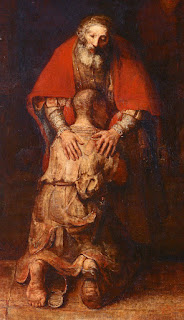'Not weighing our merits, but pardoning our offences': The Prayer of Oblation and the Prodigal(s)
Presiding at a recent Order One celebration, however, I was drawn to the Prayer of Oblation. Partly it was from a desire to ensure that its place in the rite was respected; partly it was an opportunity to revisit the Prayer of Oblation after a lengthy period of relying on the Prayer on Thanksgiving. Using the Prayer of Oblation that day, however, brought me to a new appreciation for this post-communion prayer, principally because I thought I could hear echoes of the Parable of the Prodigal.
The Prayer's opening words - 'O Lord and heavenly Father, we thy humble servants' - immediately bring to mine the dual nature declared by the words of the Prodigal:
I will arise and go to my father, and will say unto him, Father, I have sinned against heaven, and before thee, And am no more worthy to be called thy son: make me as one of thy hired servants.
At the very outset of the Prayer of Oblation, we pray in words which echo those of Prodigal, recognising our adoption in Holy Baptism as "thine own Child", but yet acknowledging that we are "humble servants". And with the Prodigal, we know that we cannot grasp at this gift, for we are "no more worthy to called" children of God:
we be unworthy, through our manifold sins, to offer unto thee any sacrifice.
Indeed, we might regard this as echoing the words of the Elder Brother, proudly telling the father of the Prodigal's failures: "which hath devoured thy living with harlots".
Standing with the Prodigal, of course, means that we too are enfolded by the Father's love and grace. When the Prayer of Oblation petitions "that all we, who are partakers of this Holy Communion, may be fulfilled with thy grace and heavenly benediction", we are with the Prodigal in the father's forgiving embrace:
But when he was yet a great way off, his father saw him, and had compassion, and ran, and fell on his neck, and kissed him.
The feast given by the father is the joyous sign and assurance of the Prodigal's forgiveness and reconciliation: "And bring hither the fatted calf, and kill it; and let us eat, and be merry". So too is the Holy Communion for us a feast upon the sacrifice:
most humbly beseeching thee to grant, that by the merits and death of thy Son Jesus Christ, and through faith in his blood, we and all thy whole Church may obtain remission of our sins, and all other benefits of his passion.
As with the feast given for the Prodigal, so our sacramental feast is the celebration of the Father's reconciling grace, renewing and restoring us as children of God. Thus, after receiving the holy Sacrament, our first corporate act is to pray 'Our Father'.The concluding words of the Prayer of Oblation - 'not weighing our merits, but pardoning our offences' - beautifully summarise the Parable of the Prodigal, setting before us the truth that in the holy Sacrament we prodigals are brought home, fed, loved, forgiven, reclothed, restored, as we spiritually feed on the Lamb "that takest away the sins of the world", the sins of each and every prodigal.





Comments
Post a Comment